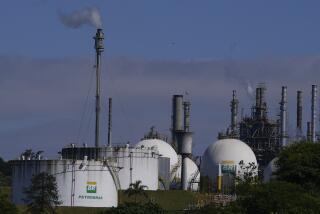OPEC Says It Will Reduce Oil Prices by Up to $1.41 a Barrel
- Share via
GENEVA — OPEC announced today that it will cut oil prices by as much as $1.41 a barrel, ending three days of emergency talks on the oil cartel’s pricing system.
The effect on the consumer could not immediately be assessed, because not all of the OPEC members agreed to it.
Each $1 cut in the price of a barrel of oil sold in the United States is equivalent to a reduction of approximately 2 1/2 cents in the price of a gallon of refined petroleum, such as gasoline, when the entire savings is passed on to the consumer.
The reductions, to take effect Friday, are expected to cut the average OPEC oil price by “about 60 cents” a barrel, Iraqi Oil Minister Qwassim Taki al-Oraibi said.
The biggest cut, by the United Arab Emirates, would be to $28.15 a barrel, down $1.41.
The president of the Organization of Petroleum Exporting Countries, Indonesian Oil Minister Subroto, told a news conference that it was “too early to say” what the effect of the price drop would be because not all members had agreed to it.
OPEC accounts for about 40% of all imported oil in the United States, or about 13% of all the petroleum consumed in the United States. The agreement was announced before most U.S. businesses were open and could be contacted for comment.
A communique issued after the meeting said Algeria, Iran, and Libya had “disassociated” themselves from the agreement and that Gabon had abstained, but that the deal was an official decision.
Fawzi A. Shakshuki, the oil minister of Libya, said in an interview as he left the hotel meeting site that his country refused to go along with the majority because Saudi Arabia would not agree to raise the price of its low- quality, cheaper crudes.
Saudi Oil Minister Ahmed Zaki Yamani said that price would remain at $26.50 a barrel.
Shakshuki said the price cuts agreed to by other members would hurt his country’s oil sales because Libya did not intend to reduce its price of $30.50. The communique said Nigeria had agreed to raise the price of its oil by 65 cents, to $28.65 a barrel. Last October it unilaterally cut its price by $2 in reaction to a similar reduction by non-member Britain.
The communique said other oils would be cut in price. Saudi light, for example, will drop $1, to $28 a barrel. This crude had served as the cartel’s benchmark, a theoretical base from which the prices of other OPEC oils were calculated according to their quality.
Subroto said the cartel had abandoned the concept of a benchmark because Saudi Light had lost much of its importance as an internationally traded oil.
“Theoretically, there is no benchmark any more,” he said.
Even so, today’s decision meant OPEC was caving in to pressures from the oil market to cut prices.
The communique said that in addition to the price cuts by the United Arab Emirates and Saudi Arabia, Indonesia would cut its price by $1, to $28.53.
The announcement said nine of the 13 ministers had agreed that the spread between the cheapest and most expensive OPEC oils should be $2.40 a barrel, rather than the $4 gap that existed before the meeting.
That would mean the price of the top quality crudes produced mainly by Algeria and other African members would have to be cut by $1.60, to $28.90. Those countries said later they would not cut their prices.
Arturo Hernandez Grisanti, oil minister of Venezuela, said the deal would be implemented and claimed it would strengthen the oil market.
“This is a majority decision, and it is a valid decision,” he said.
More to Read
Inside the business of entertainment
The Wide Shot brings you news, analysis and insights on everything from streaming wars to production — and what it all means for the future.
You may occasionally receive promotional content from the Los Angeles Times.










